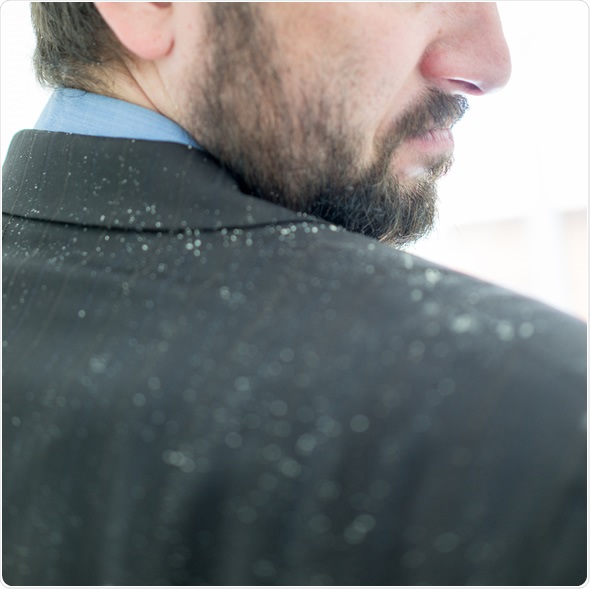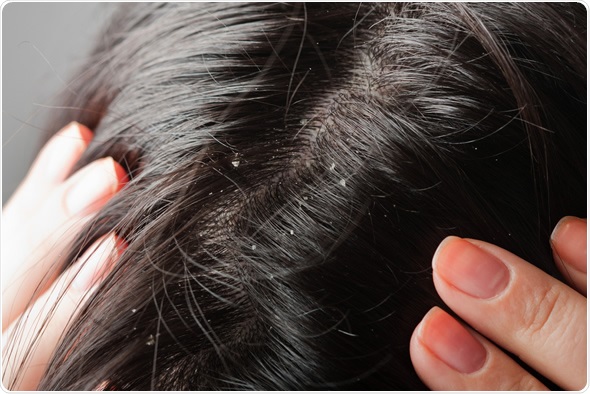According the NHS website, dandruff is estimated to affect half of all people at some point in their lives. What causes dandruff and why is it so common?
Dandruff is a common chronic scalp disorder that is characterised by flaking of the skin of the scalp. As skin cells die, they are shed from the scalp surface. For some people, however, excessive flaking occurs, resulting in dandruff.

Copyright: Zurijeta, Image ID: 220213888 via Shutterstock, Inc
Dandruff can have several causes. Dry skin is usually the most common cause and individuals are likely to get patches of dry skin elsewhere on the body. This can often become worse in the winter months due to aggravation by indoor heating such as radiators. Certain skin diseases can be a cause of dandruff, such as seborrhoeic dermatitis, eczema, and even psoriasis. Allergy or sensitivity to shampoos and hair dyes may also be a causative factor. Occasionally, overgrowth of a fungus known as Malassezia may be contributing to the problem.
Please can you outline the recent anonymous survey conducted by the British Skin Foundation (BSF) in conjunction with anti-dandruff shampoo manufacturers, Head & Shoulders (H&S)? What were the main aims?
A recent joint survey aimed to look at the potential psychological distress that can be caused by dandruff. Over 350 people were interviewed and their views were collated.
What were the main findings of this survey?
- 73% of respondents said it made them feel less attractive
- 20% claimed the condition had resulted in them being bullied and receiving verbal abuse
- 72% had tried to hide their condition from someone e.g. friends, partners
- more than a third admitted to avoiding a social situation on one or more occasion due to their dandruff
Why do you think poor scalp health sometimes has a negative impact on quality of life and self-esteem?
Dandruff, like many skin conditions, can lead to low self-esteem. Patients that suffer may feel embarrassed that their dandruff is viewed as a sign of poor grooming or uncleanliness by others. If they have symptoms of itching, this can result in anxiety, poor sleep and lack of concentration.
Patients may become socially withdrawn and refuse to participate in normal daily activities due to these factors propagating the negative self-image.

Copyright: CRM, Image ID: 174333824 via Shutterstock, Inc
What are the best ways to treat dandruff and the emotional distress caused by it?
Mild to moderate dandruff can usually be controlled with shampoos but often treatments take time to work and require persistence and maintenance. Shampoos must be left on the scalp for at least 5 minutes before they are rinsed out to give them time to work. The commonly used agents in shampoos are:
- zinc pyrithione - this is an antibacterial and antifungal agent that will reduce the level of Malassezia in the scalp, which is thought to contribute to dandruff and seborrhoeic dermatitis
- coal tar based shampoos - coal tar will help slow down the production of dead skin cells
- salicylic acid - this aids in eliminating scaling in the scalp
- selenium sulphide - this will slow production of dead skin cells and also reduce Malassezia levels. It can, however, discolour the hair, and is not recommended for blonde or chemically coloured hair.
- Ketoconazole - this also works by reducing fungal levels
If dandruff is related to eczema or sensitivity to products being used in the scalp, your doctor may prescribe a steroid lotion to be used for short periods of time.
Is it necessary to use an anti-dandruff shampoo?
It is important to wash the hair regularly to remove any excess scaling that builds up, ideally with an anti-dandruff shampoo. For some individuals, even though dandruff will clear, they may require a once or twice weekly maintenance treatment to reduce the frequency with which it may recur.
What is seborrheic dermatitis and how does it differ from dandruff?
Seborrhoeic dermatitis is one of several causes of dandruff. It can also cause scaly red, patches on the skin that tend to affect oily areas such as the face, upper back, and chest. The skin can occasionally be itchy with visible yellowish scale. In infants, it is the cause of cradle cap.
What do you think the future holds for dandruff and seborrheic dermatitis research and treatments?
Firstly, I think that more time and research will be spent looking at what exactly causes dandruff and how this is linked to changes in the immune system, particularly in relation to Malassezia.
Potential trigger factors for dandruff and how these may be minimised in addition to novel new treatments are a growing area of interest.
Lastly, it is becoming increasingly apparent that skin conditions such as this have a profound effect on the psyche of the sufferer and studies in the field of “psychodermatology” are much needed.
What advice would you give someone suffering from emotional distress from dandruff?
Please do not suffer in silence and speak to your GP or dermatologist if your dandruff is causing psychological distress. They will be sympathetic and can refer you to a clinical psychologist if needed.
We are increasing beginning to acknowledge the link between mind and skin and only too aware of the long-term effects chronic skin disease can have on the psyche.
Where can readers find more information?
Speak to your GP or dermatologist if you have any on-going concerns about how to manage dandruff. There is good online information available from the American Academy of Dermatology, British Association of Dermatologists, National Eczema Society, and Dermnet.
About Dr Anjali Mahto
 Dr Anjali Mahto is a UK trained NHS and private dermatologist based in London. Her medical training took place in South Wales, where she also obtained a degree in Pharmacology. She completed higher specialist training in dermatology in a competitive London rotation. During this time, she gained experience in some of the UK’s leading teaching hospitals including Imperial College Healthcare and the Royal Free Hospital, Hampstead. She now consults children and adults with all problems relating to the skin, hair, and nails.
Dr Anjali Mahto is a UK trained NHS and private dermatologist based in London. Her medical training took place in South Wales, where she also obtained a degree in Pharmacology. She completed higher specialist training in dermatology in a competitive London rotation. During this time, she gained experience in some of the UK’s leading teaching hospitals including Imperial College Healthcare and the Royal Free Hospital, Hampstead. She now consults children and adults with all problems relating to the skin, hair, and nails.